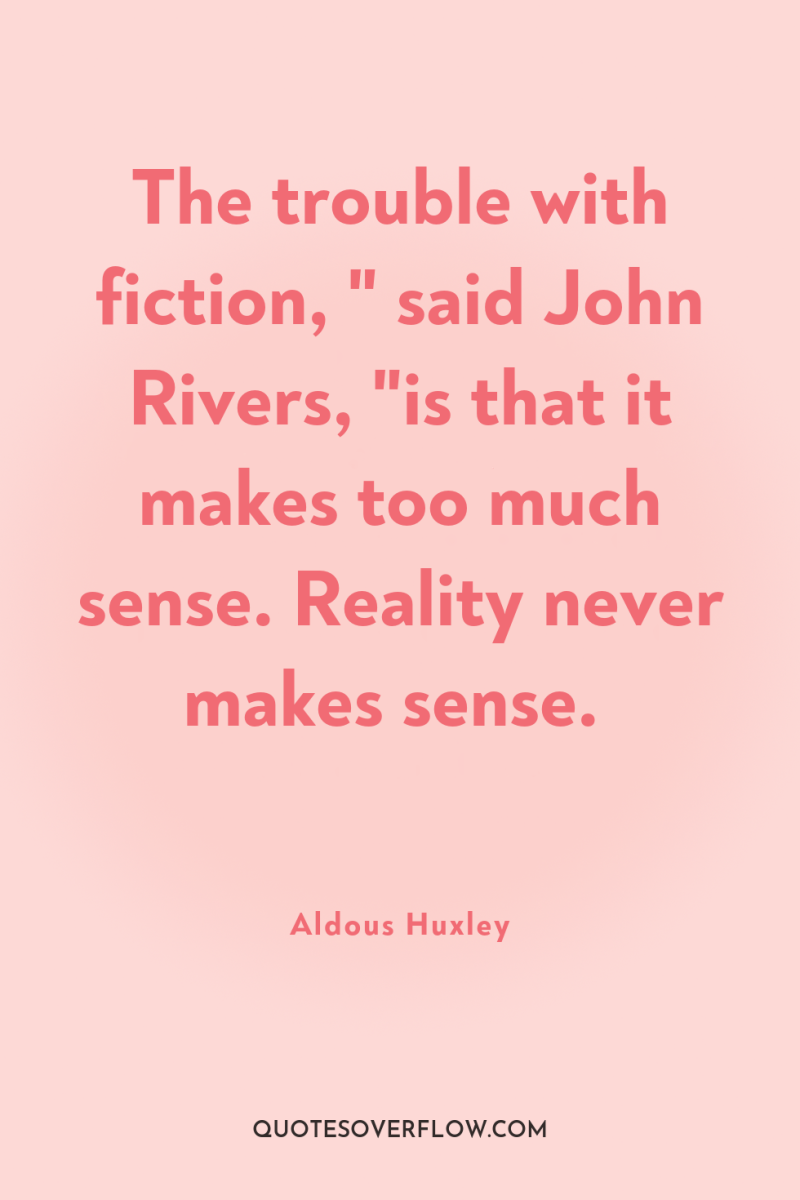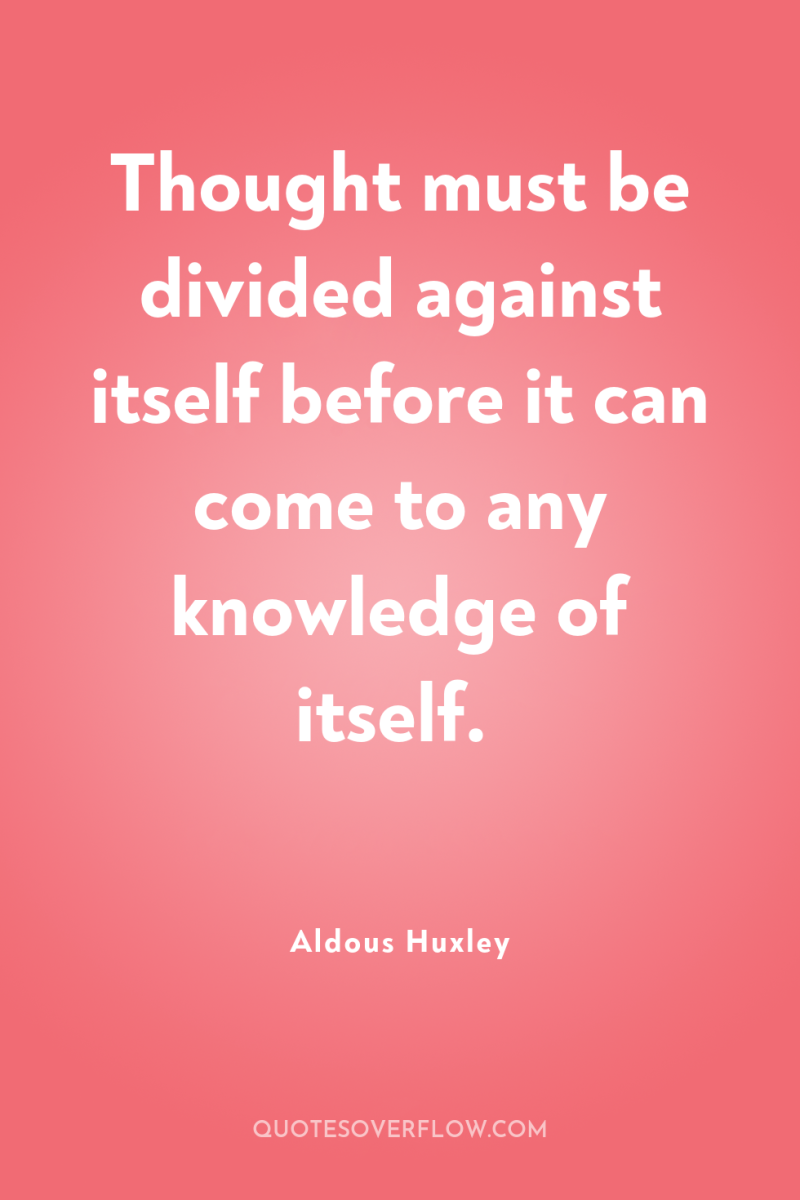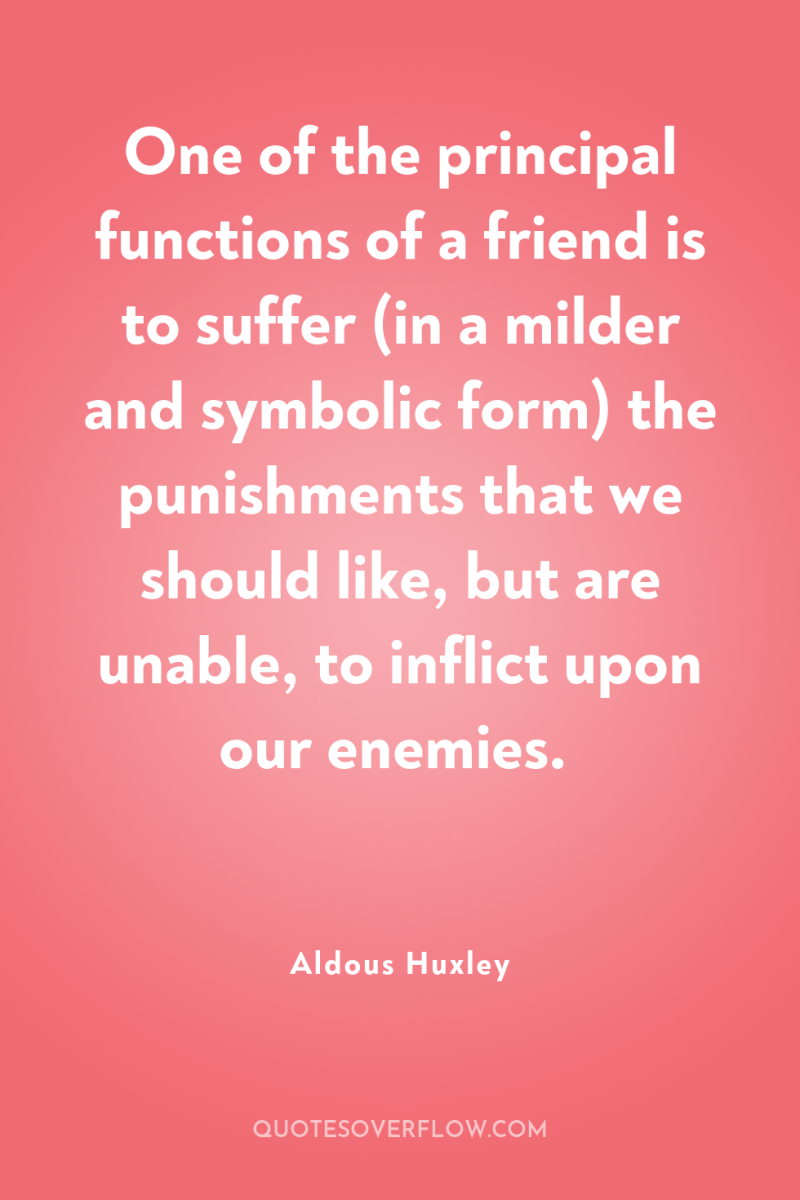
1
The trouble with fiction, " said John Rivers, "is that it makes too much sense. Reality never makes sense.Aldous Huxley
2
God isn't the son of Memory; He's the son of Immediate Experience. You can't worship a spirit in spirit, unless you do it now. Wallowing in the past may be good literature. As wisdom, it's hopeless. Time Regained is Paradise Lost, and Time Lost is Paradise Regained. Let the dead bury their dead. If you want to live at every moment as it presents itself, you've got to die to every other moment.Aldous Huxley
3
There was a thing called Heaven; but all the same they used to drink enormous quantities of alcohol.".." There was a thing called the soul and a thing called immortality.".." But they used to take morphia and cocaine.".." Two thousand pharmacologists and biochemists were subsidized in A.F. 178.".."Six years later it was being produced commercially. The perfect drug.".." Euphoric, narcotic, pleasantly hallucinant.".." All the advantages of Christianity and alcohol; none of their defects.".." Take a holiday from reality whenever you like, and come back without so much as a headache or a mythology.".." Stability was practically assured.Aldous Huxley
4
They knew how to live with nature and get along with nature. They didn't try too hard to be all men and no animal. That's the mistake we made when Darwin showed up. We embraced him and Huxley and Freud, all smiles. And then we discovered that Darwin and our religions didn't mix. Or at least we didn't think they did. We were fools. We tried to budge Darwin and Huxley and Freud. They wouldn't move very well. So, like idiots, we tried knocking down religion. We succeeded pretty well. We lost our faith and went around wondering what life was for. If art was no more than a frustrated outflinging of desire, if religion was no more than self-delusion, what good was life? Faith had always given us answer to all things. But it all went down the drain with Freud and Darwin. We were and still are lost people.Ray Bradbury

5
Thought must be divided against itself before it can come to any knowledge of itself.Aldous Huxley

6
One of the principal functions of a friend is to suffer (in a milder and symbolic form) the punishments that we should like, but are unable, to inflict upon our enemies.Aldous Huxley
7
The metaphysical mutation that gave rise to materialism and modern science in turn spawned two great trends: rationalism and individualism. Huxley’s mistake was in having poorly evaluated the balance of power between these two. Specifically, he underestimated the growth of individualism brought about by an increased consciousness of death. Individualism gives rise to freedom, the sense of self, the need to distinguish oneself and to be superior to others. A rational society like the one he describes in Brave New World can defuse the struggle. Economic rivalry–a metaphor for mastery over space–has no more reason to exist in a society of plenty, where the economy is strictly regulated. Sexual rivalry–a metaphor for mastery over time through reproduction–has no more reason to exist in a society where the connection between sex and procreation has been broken. But Huxley forgets about individualism. He doesn’t understand that sex, even stripped of its link with reproduction, still exists–not as a pleasure principle, but as a form of narcissistic differentiation. The same is true of the desire for wealth. Why has the Swedish model of social democracy never triumphed over liberalism? Why has it never been applied to sexual satisfaction? Because the metaphysical mutation brought about by modern science leads to individuation, vanity, malice and desire. Any philosopher, not just Buddhist or Christian, but any philosopher worthy of the name, knows that, in itself, desire–unlike pleasure–is a source of suffering, pain and hatred.Michel Houellebecq
8
Her cheeks were flushed. She caught hold of the Savage's arm and pressed it, limp, against her side. He looked down at her for a moment, pale, pained, desiring, and ashamed of his desire. He was not worthy, not.. Their eyes for a moment met. What treasures hers promised! A queen's ransom of temperament. Hastily he looked away, disengaged his imprisoned arm. He was obscurely terrified lest she should cease to be something he could feel himself unworthy of.Aldous Huxley
9
There were the years– years of childhood and innocence– when I had believed that carminative meant– well, carminative. And now, before me lies the rest of my life– a day, perhaps, ten years, half a century, when I shall know that carminative means windtreibend.Aldous Huxley
10
Shut lips, sleeping faces, Every stopped machine, The dumb and littered places Where crowds have been:. All silences rejoice, Weep (loudly or low), Speak-but with the voice Of whom, I do not know.Aldous Huxley
11
Henry's universe was modeled on the highball. It was a mixture in which half a pint of the fizziest philosophical and scientific ideas all but drowned a small jigger of immediate experience, most of it strictly sexual. Broken reeds are seldom good mixers. They're far too busy with their ideas, their sensuality and their psychosomatic complaints to be able to take an interest in other people - even their own wives and children. They live in a state of the most profound voluntary ignorance, not knowing anything about anybody, but abounding in preconceived opinions about everything.Aldous Huxley
12
Katy was neither a Methodist nor a Masochist. She was a goddess and the silence of goddesses is genuinely golden. None of your superficial plating. A solid, twenty-two-carat silence all the way through. The Olympian's trap is kept shut, not by an act of willed discretion, but because there's really nothing to say. Goddesses are all of one piece. There's no internal conflict in them. Whereas the lives of people like you and me are one long argument. Desires on one side, woodpeckers on the other. Never a moment of real silence. .Aldous Huxley
13
Adam is fading out. It is on account of Darwin and that crowd. I can see that he is not going to last much longer. There's a plenty of signs. He is getting belittled to a germ–a little bit of a speck that you can't see without a microscope powerful enough to raise a gnat to the size of a church.(' The Refuge of the Derelicts' collected in Mark Twain and John Sutton Tuckey, The Devil's Race-Track: Mark Twain's Great Dark Writings (1980), 340-41. - 1980) .Mark Twain
14
In what appears to have been an unplanned quip, Wilberforce asked Huxley if he thought he was descended from an ape on his father's or mother's side. Huxley retorted that he would rather have simian relatives than claim kinship with a man who used his charisma and authority to quash free debate.Jonathan Clements
15
When in 1863 Thomas Huxley coined the phrase 'Man's Place in Nature, ' it was to name a short collection of his essays applying to man Darwin's theory of evolution. The Origin of Species had been published only four years before, and the thesis that man was literally a part of nature, rather than an earthy vessel charged with some sublimer stuff, was so novel and so offensive to current metaphysics that it needed the most vigorous defense. Half the civilized world was rudely shocked, the other half skeptically amused. Nearly a century has passed since the Origin shattered the complacency of the Victorian world and initiated what may be called the Darwinian revolution, an upheaval of man's ideas comparable to and probably exceeding in significance the revolution that issued from Copernicus's demonstration that the earth moves around the sun. The theory of evolution was but one of many factors contributing to the destruction of the ancient beliefs; it only toppled over what had already been weakened by centuries of decay, rendered suspect by the assaults of many intellectual disciplines; but it marked the beginning of the end of the era of faith.Homer W. Smith
16
The man who comes back through the Door in the Wall will never be quite the same as the man who went out. He will be wiser but less sure, happier but less self-satisfied, humbler in acknowledging his ignorance yet better equipped to understand the relationship of words to things, of systematic reasoning to the unfathomable mystery which it tries, forever vainly, to comprehendAldous Huxley
17
But if one doesn't really exist, one wonders why.." she hesitated." Why one makes such a fuss about things, " Anthony suggested. "All that howling and hurrahing and gnashing of teeth. About the adventures of a self that isn't really a self–just the result of a lot of accidents. And of course, " he went on, "once you start wondering, you see at once that there is no reason for making such a fuss. And then you don't make a fuss–that is, if you're sensible. Like me, " he added, smiling.Aldous Huxley
18
What we feel and think and are is to a great extent determined by the state of our ductless glands and viscera.Aldous Huxley
19
Much of the geographical work of the past hundred years.. has either explicitly or implicitly taken its inspiration from biology, and in particular Darwin. Many of the original Darwinians, such as Hooker, Wallace, Huxley, Bates, and Darwin himself, were actively concerned with geographical exploration, and it was largely facts of geographical distribution in a spatial setting which provided Darwin with the germ of his theory.David R. Stoddart
20
It would be pleasant to believe that the age of pessimism is now coming to a close, and that its end is marked by the same author who marked its beginning: Aldous Huxley. After thirty years of trying to find salvation in mysticism, and assimilating the Wisdom of the East, Huxley published in 1962 a new constructive utopia, The Island. In this beautiful book he created a grand synthesis between the science of the West and the Wisdom of the East, with the same exceptional intellectual power which he displayed in his Brave New World. (His gaminerie is also unimpaired; his close union of eschatology and scatology will not be to everybody's tastes.) But though his Utopia is constructive, it is not optimistic; in the end his island Utopia is destroyed by the sort of adolescent gangster nationalism which he knows so well, and describes only too convincingly. This, in a nutshell, is the history of thought about the future since Victorian days. To sum up the situation, the sceptics and the pessimists have taken man into account as a whole; the optimists only as a producer and consumer of goods. The means of destruction have developed pari passu with the technology of production, while creative imagination has not kept pace with either. The creative imagination I am talking of works on two levels. The first is the level of social engineering, the second is the level of vision. In my view both have lagged behind technology, especially in the highly advanced Western countries, and both constitute dangers. .Dennis Gabor
21
Actual happiness always looks pretty squalid in comparison with the over-compensations of misery.Aldous Huxley
22
For I am you and you are I.Aldous Huxley
23
On the morning of November 22nd, a Friday, it became clear the gap between living and dying was closing. Realizing that Aldous [Huxley] might not survive the day, Laura [Huxley's wife] sent a telegram to his son, Matthew, urging him to come at once. At ten in the morning, an almost inaudible Aldous asked for paper and scribbled "If I go" and then some directions about his will. It was his first admission that he might die ..Around noon he asked for a pad of paper and scribbled L S D-try itintermuscular100mm In a letter circulated to Aldous's friends, Laura Huxley described what followed: 'You know very well the uneasiness in the medical mind about this drug. But no 'authority', not even an army of authorities, could have stopped me then. I went into Aldous's room with the vial of LSD and prepared a syringe. The doctor asked me if I wanted him to give the shot- maybe because he saw that my hands were trembling. His asking me that made me conscious of my hands, and I said, 'No, I must do this.' An hour later she gave Huxley a second 100mm. Then she began to talk, bending close to his ear, whispering, 'light and free you let go, darling; forward and up. You are going forward and up; you are going toward the light. Willingly and consciously you are going, willingly and consciously, and you are doing this beautifully – you are going toward the light – you are going toward a greater love … You are going toward Maria's [Huxley's first wife, who had died many years earlier] love with my love. You are going toward a greater love than you have ever known. You are going toward the best, the greatest love, and it is easy, it is so easy, and you are doing it so beautifully.' All struggle ceased. The breathing became slower and slower and slower until, 'like a piece of music just finishing so gently in sempre piu piano, dolcamente, ' at twenty past five in the afternoon, Aldous Huxley died.Jay Stevens